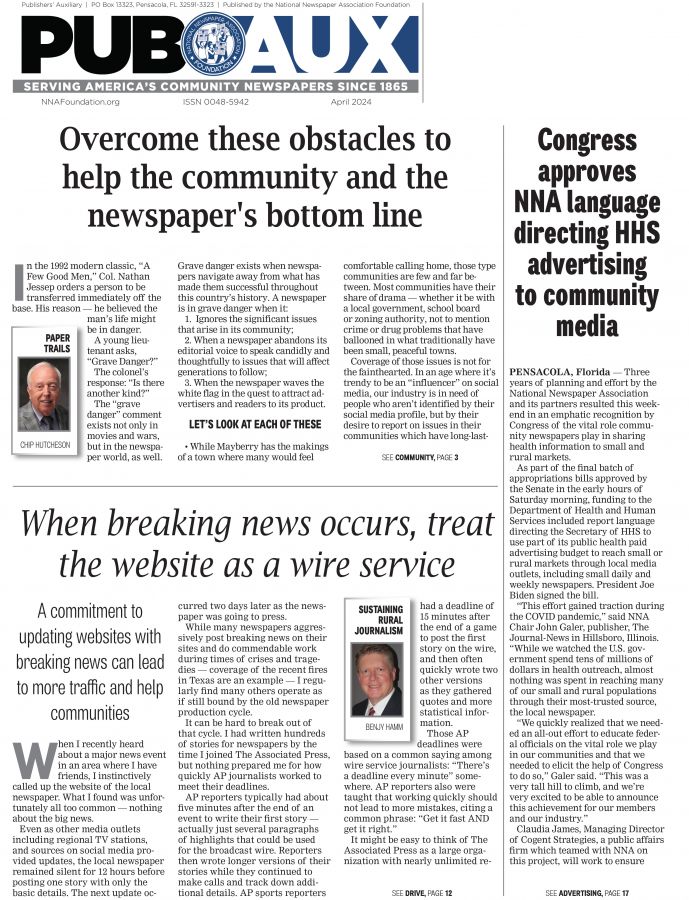Doing more with less; investigative journalism can be done
Oct 1, 2013
By Lisa Carotenuto
Walter Cronkite School of Journalism and Mass Communications
PHOENIX, AZ—Many newspapers cut back staff because of the poor economy during the last decade. And because of this, investigative journalism suffered—not enough money to fund long-term investigations.
But a panel of distinguished Arizona journalists provided information on how investigative reporters could continue to produce quality work in the face of diminishing newsroom budgets. The group spoke during the National Newspaper Association’s 127th Annual Convention & Trade Show here Sept. 13. Brandon Quester, associate director for the Arizona Center for Investigative Reporting, moderated the panel.
Award-winning journalist Monica Alonzo of the Phoenix New Times said that requesting copies of public records could get pricey—in Arizona. It costs about $1 a page to make copies of public records. She suggested using a portable scanner to scan documents as well as a smart phone to take photos of documents. Public agencies do not charge to look at documents. Quester agreed with Alonzo, noting that he takes a portable scanner when he is accessing public documents.
A common theme among the panelists was how to convince newsroom management that investigative reporting pays off. Reporters need to be able to convince their editors that the story is worth the amount of money it is going to cost to research and report.
Award-winning investigative journalist Lauren Gilger of ABC15 News in Phoenix, said that investigative journalists working in TV could teach their brethren in newspapers a lesson. She explained that TV investigative journalism is about branding. A station’s investigative team communicates and emphasizes the unique talents and attributes that it brings to furthering the public interest of its community. Investigative reporters who work for newspapers could also cultivate a brand and communicate it to the public.
Gilger said that it is costly to produce in-depth investigative projects for TV, but if the right investigations are pursued and produced, they can pay off for the station and its management. Gilger was part of a team that investigated a 17-year-old Payson, AZ, girl’s death after she lost control while driving her 2002 Ford Escape. That investigation ultimately led to Ford Motor Co. paying almost $17.4 million in civil penalties to the federal government to settle allegations that it was too slow in issuing recall directives for its 2001-2004 Ford Escapes.
Alonzo added that investigative journalists should pick interesting stories that have a lifespan to allow for follow-up stories. She cautioned against picking stories that are “one-hit wonders.”
Evan Wylogue of the Arizona Capitol Times, emphasized that investigative work can be a moneymaker; it doesn’t have to operate at a loss. Wylogue has worked with management and the advertising team at the newspaper to explore how to monetize investigative work. Ultimately, his newspaper has found sponsorships to be effective. Wylogue has worked to make the Arizona Capitol Times an innovator in fast, reliable, and robust live elections coverage, helping to establish databases that can be used for elections analysis.
As a pitch to advertisers, an investigative reporting staff could emphasize how many people are accessing the company’s website, or as Wylogue said, “how many eyeballs are on the page,” and how long they are staying on it. Wylogue noted that because of the investment that had been placed in the Arizona Capitol Times’ live elections databases and coverage, visitors to the website were spending an average of 37 minutes on a page, a considerably longer time than what he believed was the industry average—about two minutes a page.
Quester agreed when he said seeking sponsorships can be an effective way of funding investigative reporting projects, but he cautioned those that work for non-profit organizations to be careful from whom they accept money.
Quester also stated that his agency believes in collaboration with other newsgathering entities, not competition. A cooperative spirit could lead to better investigative reporting at the state level and not just at individual organizations. His forum, for example, does good data analysis mapping that can be shared with other organizations that don’t have his resources.
Craig Harris of the Arizona Republic spoke about the need to keep public records accessible to the public. He said that in Arizona, there is action by the state legislature and the governor’s office to restrict public access to certain public records. Harris encouraged public constituencies to fight against public agencies that want to write rules that restrict public records access.
Alonzo passionately agreed with this point.
“Public information is our (citizens) information.” She encouraged investigative reporters to stay on a story even if there are roadblocks to accessing public information. “Don’t think of a refusal or denial of a (public records) request as a defeat. That, too, can be a story.” ©







